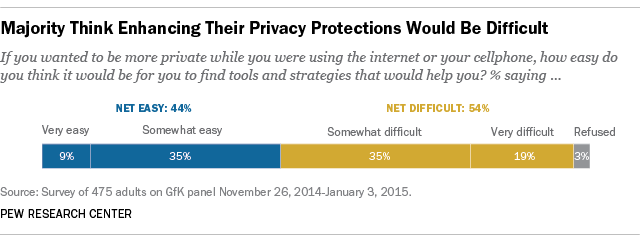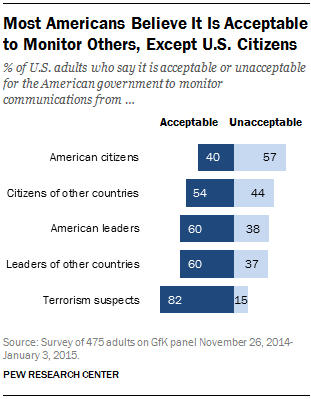A string of revelations over the past two years about the National Security Agency’s domestic and international surveillance efforts have brought new awareness to many Americans about online privacy and security concerns. Yet most American adults have not made significant changes to their digital behavior, and 54% say that it would be “somewhat” or “very” difficult to find the tools and strategies that would enhance their privacy online and when using cellphones, according to a Pew Research Center report.

Why haven’t most Americans taken a more aggressive approach to protecting their digital data? When we asked respondents to tell us in their own words, several possible – and sometimes overlapping – reasons emerged:
I have nothing to hide
One of the most common refrains among those who had not made many changes in their online practices in response to government monitoring programs was that they had “nothing to hide.” This exact phrase appeared repeatedly, but also was reflected in statements that suggested a similar rationale:
“I have nothing to hide from the government so I have not made any changes since learning about U.S. phone and internet monitoring programs.”
“I have not changed anything, I feel confident that I am an honest person with nothing to hide.”
[made changes]
“I haven’t done anything because I don’t do anything that I am ashamed of or that is wrong.”
I do not have the time or expertise
Some of the open-ended responses from those who did not adopt the various tools or strategies noted the significant time and effort it takes to learn about privacy-protecting measures:
“I do not know anything about some of them and do not have the time to research them at this time.”
“I do not feel expert enough to know what to do to protect myself, and to know that the protection chosen is effective. Technology changes very fast.”
“Don’t know about a lot about computers.”
It won’t prevent monitoring anyway
Another group of respondents expressed the view that additional efforts to protect the privacy of their digital communications wouldn’t be effective:
“I don’t think it will make much of a difference.”
“It doesn’t hurt to try to keep the government out of everything but they have the resources to get past everything anyway …”
“This is all a joke to get people to buy stuff that all has back doors for snooping.”
I don’t want to raise suspicions or invite scrutiny
Others said they had not changed certain aspects of their behavior because they believe that taking such measures could make them appear suspicious or that certain activities could trigger additional monitoring:
“I did not change my behavior because it’s not going to make them stop monitoring me or others. If I change I guess it would send them a red flag to want to monitor me more because it would appear SUSPICIOUS.”
“I didn’t significantly change anything. It’s more like trying to avoid anything questionable, so as not to be scrutinized unnecessarily.”
“I have no *need* for anything further. At some point ‘attempting’ to protect your own privacy will be seen as having a ‘need’ to hide something, and thus inviting further violations.”
I am comfortable with the monitoring because it makes us safer

Among the least likely to use some of the more sophisticated tools to protect their privacy were those who said they were not concerned about the surveillance programs, and those who said they believe the monitoring programs are serving the public interest. When some of these respondents were asked to elaborate on their low level of concern about the programs, they offered a range of comments that emphasized the perceived benefits for national security:
[s]
“Small price to pay for maintaining our safe environment from terrorist activities.”
“Some monitoring is required to keep Americans safe. The government is just going to review and delete information on boring people like me.”
While only a minority of Americans (40%) feel it is acceptable for the government to monitor ordinary American citizens, many think it is acceptable to monitor others in a variety of other situations. Americans generally support the use of surveillance to investigate criminal activity, as well as circumstances when a person’s digital activity may raise suspicion of potential involvement with terrorism or violent acts.
At the same time, respondents are split on other activities that might warrant closer scrutiny. Notably, this includes certain privacy-enhancing behaviors: 49% believe it is acceptable to monitor the communications of a U.S. citizen who has “used encryption software to hide files,” while 47% think this kind of surveillance is unacceptable. However, awareness of how these tools work and what they are used for may be relatively low. For instance, among a subset of respondents who had heard at least “a little” about the government monitoring programs, 31% said they didn’t know about email encryption tools.